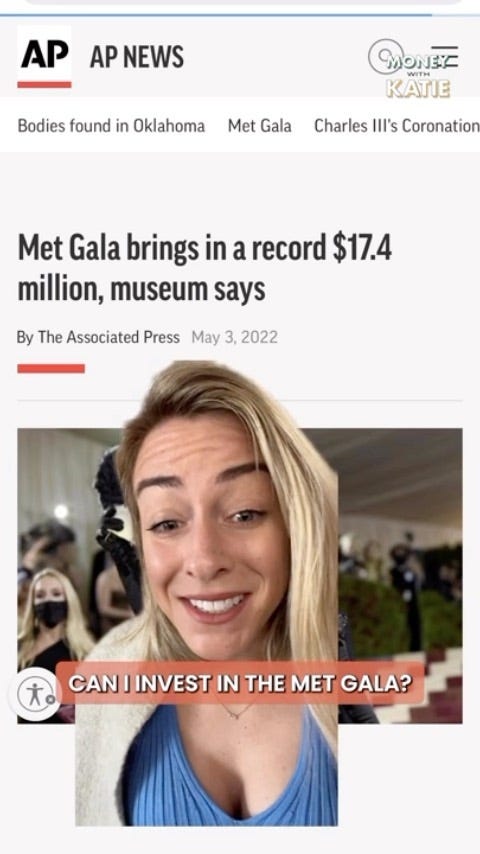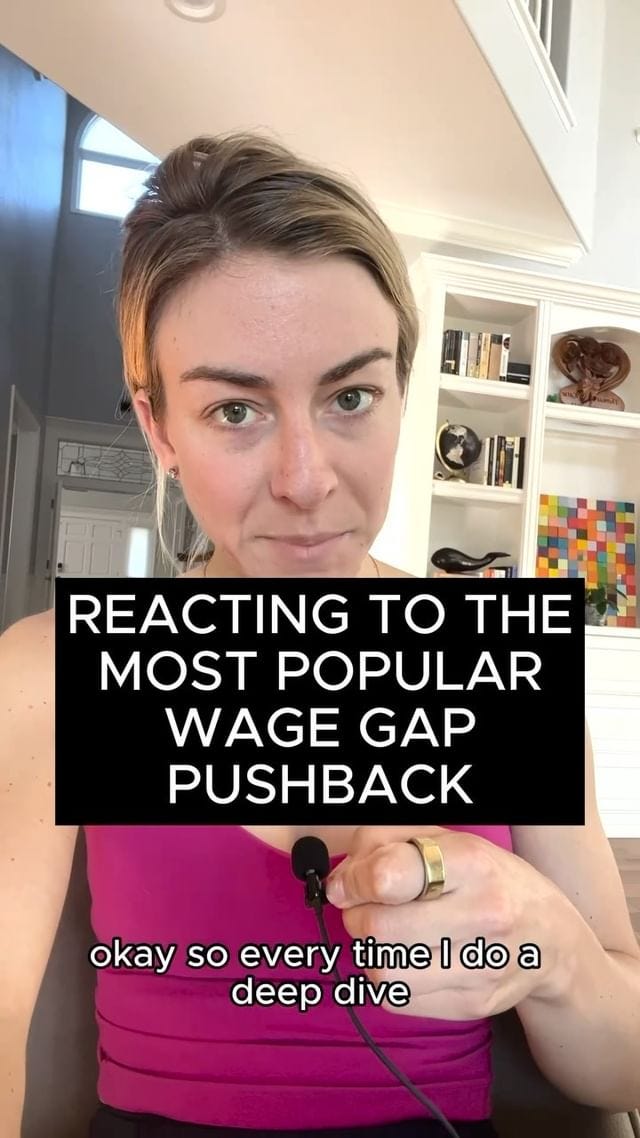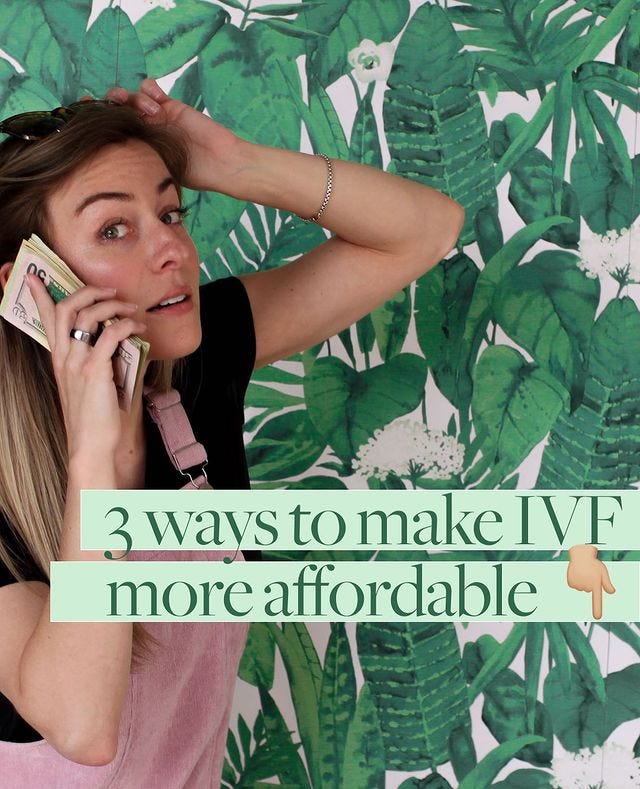I’m in the hemorrhaging-cash-stage of life. And I can’t even blame inflation. Apparently I’m not alone.
✅ 77 million Millennials purchased a home during COVID
✅ 1 in 5 households adopted a puppy during pandemic
✅ 43 million borrowers with student loan payments resumed
✅ 45% of babies born in 2019-2021 to women age 30-39
Yes, I belong to each and everyone of those cash-burning statistics 😱 I have daycare, debt, a dog and a dwelling that depletes my dollars. Add to that my partner is one of those beloved but barely paid elementary school teachers, and it’s an American tale as old as time.
As an ambitious human, who can’t leave clothes in the dryer overnight for fear of wrinkling, I consume a great deal of content on how the heck to manage it all. The former financial news reporter in me can’t help but be slightly horrified that the information I find most compelling at the moment is from a former corporate flak. But Katie Gattie Tassin, otherwise known as Money With Katie, is killing it y’all.
She’s a podcaster and blogger with Morning Brew, and she’s hilarious. From self deprecation, “just a chic with a podcast,” to references that make me giggle out loud, “Saddle up ladies, we ride at dawn!” I feel seen.
In a sea of half-baked, like-pandering, salesy content, it’s such a relief to see some intellectual rigor applied to important ideas.
For instance, when looking into research determined to discredit the myth of the “underpaid public educator” Katie points out that most studies comes from two dudes with a questionable underlying data set, leaving her “wondering which elementary school teacher hurt them.” 😂
She also goes beyond the obvious 401k, index fund, debt-payoff advice to address subjects that actually matter in my life 😉
So without further ado, allow me to guide you through Katie’s work, via the lens of someone who is not a finance noob (ask me about my reporting on exotic swaps), but is looking for support where taxes meet toddlers.
Becoming a Sugar Mama
Income level is a significant factor in my wanna-be sugar mama status.
It would be easy, then, to assume I'm invested in the oft-touted statistic showing the median American woman working full-time earns 83 cents for every dollar a man earns. This is boring. That’s because age, profession, and race skew the number wildly.
Very few people delve into the harder questions behind the data, which, surprisingly, has nothing to do with outright man-hating. The truth is FAR more complicated, and interesting.
In one phenomenally researched episode1 Katie goes “on a winding journey through everything from Bureau of Labor Statistics data to evolutionary biology,” tackling the very nuanced and important realities of women at work. Do we really work fewer hours than men? Do we choose jobs that are easier? Spoiler alert: No
“Work has long been structured to favor employees who are constantly available and willing to work 24/7, which inherently preferences whichever gender is more available all the time.”
Don’t have enough time? Here’s the TLDR:
Katie works hard at reaching beyond her privileged, high-income background. The aforementioned episode2 on teacher pay is excellent with some mind-blowing nuggets (hello 403b scam 🤯).
As is her deep dive3 into the “working-class girl's life” which, she points out, has taken a back seat to the plight of female self-esteem and body image in feminist issues. She makes a strong case that the ‘hustle culture’ rhetoric flat out ignores the impossibility of choices facing lower-income women.
“Dear audience, we can disagree about the best ways to solve these problems, but I think it's important that we're unified in our agreement that it's a problem worth solving. It's a feminist issue, it's a human rights issue.”
Speaking of girl power, her pushback on the current trend of wealth accumulation as a feminist issue carries excellent subtleties, “You’re telling me that making myself fabulously rich is also good for women everywhere? Incredible!”
“The danger of consistently reinforcing the tenuous connection between specific tactics as ways to “fight back” (salary negotiation techniques, financial literacy) and the larger issues they purport to meaningfully improve (a persistent disparity in income and wealth by gender, women trapped in the low-wage cycle, etc.) is that it suggests a causal relationship where one probably doesn’t exist.4”
And I can’t believe she went there, but yes, her take5 on the resurgence of Sugar Baby culture is, well, fascinatingly on point.
“There's a stripping down of human connection, reducing it to its basest stereotypical impulses: Women just want money, men just want sex. But what happens to money over time? Well, it grows. It compounds, exponentially in fact. But the half-life of youth and beauty, those have an inherent expiration date. It's a troubling dynamic when one party is inherently biologically set up to expire and lose the thing that supposedly gives them value.”
Kids Change Things (no shit)
A decision in my early 30’s, while working at a unicorn startup that wooed employees with fertility benefits instead of 401k matching, is the reason I am a parent today. I don’t say that lightly. That $50,000 coverage for egg and embryo freezing meant that years later, when we finally decided to have kids, our costs were much much lower.
1 in 6 people on this planet are affected by infertility6 and the costs go far beyond finances. But in the US, money is a major factor. As Katie notes, “the out of pocket costs can equal nearly an entire year of the median take home pay in the US.”
In one episode7 she offers specific, tactical guidance on how to navigate the economics of reproduction and birth.
“I don’t think there should be shame associated with needing to take out loans to amortize the cost of something this large and important over time.”
I’m now among the lucky ones to have a kid, but have become quickly overwhelmed by the cost of childcare and its impact on our financial freedom. Enter Katie:
“Really we're trying to solve for those 20 years when your expenses will be higher and rising, which means your save rate, all else held equal, will be lower.”
This episode8 delves into the nitty gritty of how much kids might set you back, while staying very human about it all.
“There are basically two obvious ways to navigate the way children impact your finances: to either save and invest a lot before you have them, and/or focus on increasing your income after you do….The fact that we don’t live forever makes these decisions meaningful.”
#Adulting
One of the more difficult things I’ve witnessed over the last few years has been watching my mother manage the emotional, financial and physical experience of caring for her parents. It’s a reality laden with much unsaid and has radically changed the conversation my sisters and I are having with our parents. Or, as Katie perfectly captures:
“Do you wanna be cremated and have your ashes loaded into fireworks? [We] want to make sure to give your earthly selves one last final hurrah.”
Seriously though, this episode9 on aging parents slaps. I learned the intricacies of long-term care coverage and how a reverse mortgage is an option to consider when your loved ones don’t have much saved.
Last but not least, getting older means more medical costs. It’s an uncomfortable fact. But as I inch closer towards that annual mammogram age 🙄 her deep dive into medical debt resonated, “If we're eyeballing it, roughly $250 billion out-of-pocket expenses in the US are because of price gouging, incorrectly denied insurance claims and billing errors.” 😱
She walks us through a step-by-step approach on how to fight these. And then, get this, the woman she interviews in the episode is the CEO of a medical bill advocacy agency, and she gives us her personal email address. Praise be.
In all her work, Katie doesn’t just paint a picture with data, she explores ways to solve these issues. And she does it with a sense of humor, a dose of reality and importantly, nuance that is sorely missing from most talking heads of personal finance.
I may have daycare, debt, a dog and a dwelling that depletes my finances, but I also have Money With Katie and her #richgirlsnation, and as she says, “If there is a hack to be hacked, we’re hacking it.”
💬I’m curious
Are you a #richgirlnation fan? Where do you go for advice on how to navigate the finances of real life? How are you managing the hemorrhaging-cash-stage of life? 🤑
This is my fifth and final essay while participating in Write of Passage Cohort 11. Huge thanks to everyone who helped me edit and refine!
https://moneywithkatie.com/blog/is-it-feminist-to-get-rich#:~:text=I'd%20argue%20the%20accrual,step%20in%20the%20right%20direction.
https://www.who.int/news/item/04-04-2023-1-in-6-people-globally-affected-by-infertility









I don't know whether to say thank you, or to be freaked out by all the information here, Cris!
I adore the way you collate and present information. It is immediate and engaging. I hope that someone in a future cohort of WoP will choose to curate your work, because ...
- Kid Change things (No shit)
- Sugar Mama
and so many similar gems
Thank you for giving me 10+ extra hours of podcast backlog!! Really enjoyed reading this Cris!